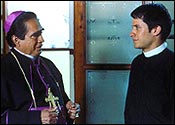
|
Amaro fails to deeply portray a church in crisis
Making it no art house treasure.
|
Arthur J Pais
You do not have to be an admirer of the Graham Greene novel The Power And The Glory and its movie version, The Fugitive to dislike the film El Crimen del Padre Amaro.
The flawed 1947 movie version of the Greene classic is a much better film than Padre Amaro. And so is this year's Oscar-worthy The Magdalene Sisters, a searing study of repression in Irish convents.
Both The Fugitive and Amaro deal with the tortured soul of a Catholic priest and the issue of celibacy. The latter film is also known as The Crimes of Father Amaro.
The John Ford directed Fugitive was a gripping work detailing the life of a lapsed alcoholic priest. And the new film, Amaro, deals with degeneration and debauchery in the church. Amaro, which grossed $20 million to become the highest grossing Mexican film in that country, is a timely and universal work.
But Amaro is no art house treasure though it has been shown at several film festivals including the Toronto International Film Festival (TIFF) where it was overshadowed by The Magdalene Sisters, the utterly sober, riveting and thought provoking movie.In limited release in America. Director Carlos Carrea's Amaro, is one of those movies that sit uneasy in art theaters. And it is not the kind of art theatre film, like Amelie, which broadens its appeal on the strength of great word of mouth. Controversies do not always boost a movie.
Martin Scorsese's The Last Temptation Of Christ, for instance, bombed big time despite weeks of protest and demonstrations against it. But the condemnation by the Catholic church of Amaro for showing priests having sex and conspiring with drug lords and left wing guerrillas ignited plenty of curiosity about the movie. And surely, the audiences liked its drama with sex and lurid details. And the immensely popular Gael Garcia Bernal (Amores Perros, Y Tu Mama Tambien) who plays Padre Amaro also boosted the movie's appeal. The movie revolves around the handsome and idealistic Amaro, who is sent to a small parish in Mexico for training before a stint in Vatican.
 Everyone seems to want to know him, and each person has his own agenda, ranging from sexual intention to power play. Some want him to ignore the ignoble work many priests are involved in. The mayor's wife, in a dramatic moment in the film, offers him cash during a confession, asking him to use it for charity. A young woman, who comes to confess her sins, finds herself sharing her sexual secrets with him. The movie becomes more and more predictable as it proceeds. We see Amaro's corruption in the making quite early on in the film.
Everyone seems to want to know him, and each person has his own agenda, ranging from sexual intention to power play. Some want him to ignore the ignoble work many priests are involved in. The mayor's wife, in a dramatic moment in the film, offers him cash during a confession, asking him to use it for charity. A young woman, who comes to confess her sins, finds herself sharing her sexual secrets with him. The movie becomes more and more predictable as it proceeds. We see Amaro's corruption in the making quite early on in the film.
Despite the striking visuals and a decent performance by Bernal, the movie misses an opportunity to be a deeply etched portrait of individuals and church in crisis.
Tell us what you think of this review